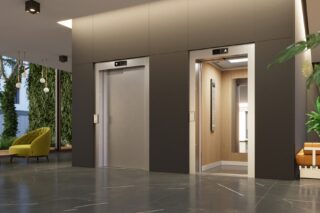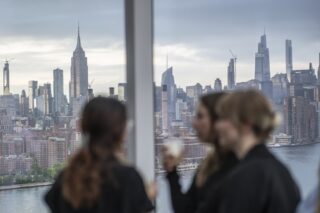GOA architecture firm completed Yada Theater in a newly developed town in China’s southeastern region Jiangsu Province, known for the country’s largest bamboo forest and capital of Chinese pottery production.
In 2020, Chinese architectural firm GOA Group of Architects completed the planning of the new town Yangxian Xishan, located in Yixing City in southern Jiangsu province, China. The young town began accepting new tenants in September of the same year and has since welcomed 1,000 households, according to Yada International, the investor behind the development of Yangxian Xishan.
“It is like a “migratory-bird-style” retirement resort for people. Many have bought their houses here and come to spend weekends and vacations,” XU Qi, one of the lead architects of Yada Theater, stated in an email correspondence with ArchiExpo e-Magazine.
GOA led and developed the master plan for almost 400 hectares of land that integrates nature and contemporary architecture. The town includes living amenities, medical and commercial services, and recreational and cultural facilities—such as Yada Theater, completed and opened in mid-2022.
“During the 2023 Chinese New Year, there were over 10,000 visitors per day [in the town], as far as I know,” CHEN Binxin, the GOA planner of Yangxian Xishan and lead architect of most plots in the town, stated in an email correspondence with ArchiExpo e-Magazine.
QUICK FACTS:
- Yangxian Xishan is a newly developed town in China funded by Yada International and planned by GOA (Group of Architects). Many of the buildings were completed in 2020 but Yada Theater opened in mid-July 2022.
- Prior to the town development, woods and abandoned farmlands covered the area. The remaining villagers, however, received compensation for land collection and found job opportunities in the tourism industry.
- The architects implemented local materials into the construction of the buildings, including Yada Theater for which they chose a locally fired ceramic facade with a celadon glaze and interior wall panels made of anti-corrosion-treated local bamboo and wood.


How the Yada Theater Is Quickly Becoming a New Cultural Landmark
A year after earning the Jury Winner in the Cultural-Unbuilt Cultural category in the 2021 Architizer A+Awards, the Yada Theater held its opening premiere entitled “Steinway Midsummer Returnee Chamber Music Concert”.
As part of an ongoing holistic planning process, the theater occupies a central role in town life. In addition to serving as a venue for performing arts events, the Yada Theater aims to be a gravitational force, drawing vitality and new opportunities to the area from nearby cities. It also acts as a crux for the town’s capacity to draw on its own economy of natural resources and tourism to become self-operating, and able to support its own governance and maintenance.
“[Since] September 17, Returning Home, a large original contemporary Wuxi Opera, has been performed every Saturday in Yada Theater. It draws many residents and tourists. The ticket price is 50 Chinese yuan per show, which is very affordable,” as stated by a representative of Yada International in an email correspondence with ArchiExpo e-Magazine.



Wedding the Landscape and Respecting Cultural Heritage
The Yada Theater weds the existing geography of the site, taking advantage of its natural qualities to optimize the theater’s unique characteristics. The theater sits on hilly terrain on the edge of Yangxian Lake, occupied by China’s largest primitive bamboo forest, which is a significant tourist attraction.
“Yangxian Xishan is located in Yixing City, also known as China’s pottery capital and the home of traditional pottery firing techniques that have been passed down for thousands of years,” XU Qi stated.
To arrive at the theater, visitors follow a road that curves along the hillside towards shallow concrete steps which are set into a vegetated slope leading to the theater’s entrance and to a cafe. The roofs of the building rise upwards towards the landscape, with skylights that flood the interior with light and offer extensive landscape views.
The multifunctional auditorium adapts to the shape of the land, extending to the stage along the hill’s slope in order to maximize the preservation of the site’s spatial qualities. The stage’s backdrop is a large glass window opening outwards towards the landscape, providing spatial permeability between inside and out. The 530-seat convertible auditorium can satisfy diverse needs, transforming between open and picture-frame stages, to house concerts, dance and theater productions, as well as large community events.

Simultaneously, Yada Theater strives to embrace both contemporary design and regional identity, incorporating a selection of materials that preserve cultural heritage. In addition to being famous for China’s largest bamboo forest, Yixing has been the capital of Chinese pottery production, known most notably for its clayware, since the Song Dynasty, which began in 960 and lasted until 1279. The Yada Theater’s façade features a mixture of locally fired grayish-green ceramic smooth and fluted panels framed by thin strips of aluminum.
“We chose a locally fired ceramic facade with a celadon glaze to respond to this significant historical and cultural memory,” XU Qi added. “Additionally, the interior wall panels are made of anti-corrosion-treated local bamboo and wood, which satisfy the auditorium’s sound requirements while celebrating a natural interior experience.”



Refusing to Bank on Gentrification and a Non-exclusionary Design
We often hear stories of how cities allow investors to extort citizens in order to revamp a neighborhood or plan a new development. And while the area where the town Yangxian Xishan now sits displayed mostly woods and abandoned farmlands, Yada International offered compensation to the remaining villagers for land collection, according to XU Qi.
“The client created an ecotourism-friendly environment by preserving the local tea fields and woodlands. The remaining villagers found job opportunities in the tourism industry. Some of them started small businesses such as farm markets, farm restaurants, and other agritainment options. As a result, the town’s development benefited and was welcomed by the locals.”
To strengthen this idea of anti-gentrification, Yada Theater implements a traditional Jiangnan Garden layout which eliminates the enclosing, exclusionary space often found in traditional theaters. The grounds are open and accessible, allowing visitors to roam between the built environment and nature.
The layout is also meant to encourage a physical experience of the site’s geomorphological features. From a central courtyard, on which sits a restaurant and visitor lounge, a network of open spaces expand outwards in different directions towards connecting covered corridors and further courtyards. These pathways create a pedestrian circuit along the hilly slopes of the theater’s surroundings.











